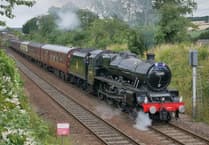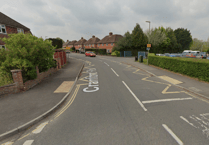Farnham's annual Walk of Witness again took place on Good Friday under the auspices of Churches Together in Farnham.
It followed the usual route, with opening prayers by Deacon John Edwards and closing hymn and prayers at St Andrew’s Church by Rev David Uffindell.
There were around 250 in attendance with some concern expressed in advance about traffic congestion, but the event passed peacefully.
The Easter Walk of Witness is a traditional Christian event that has been taking place in the United Kingdom since the early 20th century.
It is a public procession of Christians who walk through the streets of their local town or city, often carrying banners and singing hymns, as they celebrate the resurrection of Jesus Christ on Easter Sunday.
The first recorded Easter Walk of Witness in the UK took place in Sheffield in 1916, during the First World War. The event was organised by a group of Methodist churches who wanted to show their solidarity with soldiers who were fighting in the war. The walk began at the City Hall and ended at the Parish Church, where a service was held.
The Easter Walk of Witness became more widespread in the 1920s and 1930s, as other Christian denominations joined in the celebrations. In many cities, the procession would stop at various points along the route for prayers and hymns. It was seen as an important way for Christians to demonstrate their faith and to show the public that Christianity was still a relevant and important part of British society.
During the Second World War, the Easter Walk of Witness continued, despite the difficulties caused by the war. In many cases, the processions were led by local clergy who were also serving as chaplains in the armed forces.
In the post-war period, the Easter Walk of Witness continued to be an important event for many Christians in the UK. However, in some places, the tradition has declined in popularity, as attendance at church services has fallen and the public face of Christianity has become less prominent.
Today, the Easter Walk of Witness is still celebrated in many towns and cities across the UK, with people of all ages and denominations taking part. It remains a powerful symbol of Christian unity and a reminder of the central message of the Christian faith.




